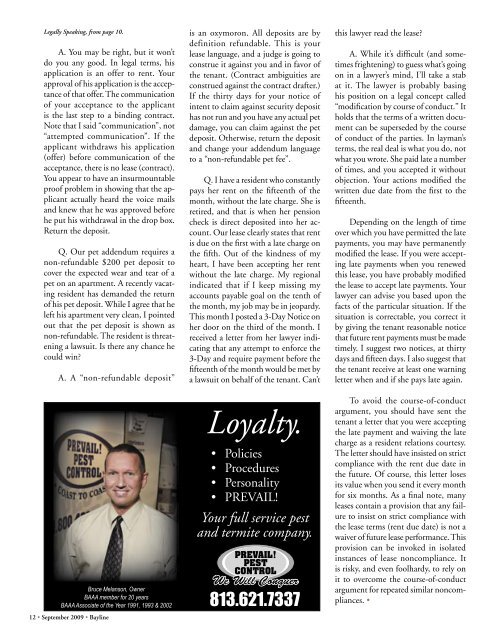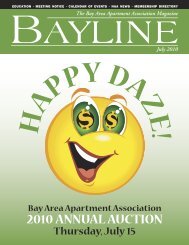Bayline September 09.indd - Bay Area Apartment Association
Bayline September 09.indd - Bay Area Apartment Association
Bayline September 09.indd - Bay Area Apartment Association
You also want an ePaper? Increase the reach of your titles
YUMPU automatically turns print PDFs into web optimized ePapers that Google loves.
Legally Speaking, from page 10.<br />
A. You may be right, but it won’t<br />
do you any good. In legal terms, his<br />
application is an offer to rent. Your<br />
approval of his application is the acceptance<br />
of that offer. The communication<br />
of your acceptance to the applicant<br />
is the last step to a binding contract.<br />
Note that I said “communication”, not<br />
“attempted communication”. If the<br />
applicant withdraws his application<br />
(offer) before communication of the<br />
acceptance, there is no lease (contract).<br />
You appear to have an insurmountable<br />
proof problem in showing that the applicant<br />
actually heard the voice mails<br />
and knew that he was approved before<br />
he put his withdrawal in the drop box.<br />
Return the deposit.<br />
Q. Our pet addendum requires a<br />
non-refundable $200 pet deposit to<br />
cover the expected wear and tear of a<br />
pet on an apartment. A recently vacating<br />
resident has demanded the return<br />
of his pet deposit. While I agree that he<br />
left his apartment very clean, I pointed<br />
out that the pet deposit is shown as<br />
non-refundable. The resident is threatening<br />
a lawsuit. Is there any chance he<br />
could win?<br />
A. A “non-refundable deposit”<br />
Bruce Melanson, Owner<br />
BAAA member for 20 years<br />
BAAA Associate of the Year 1991, 1993 & 2002<br />
12 • <strong>September</strong> 2009 • <strong><strong>Bay</strong>line</strong><br />
is an oxymoron. All deposits are by<br />
definition refundable. This is your<br />
lease language, and a judge is going to<br />
construe it against you and in favor of<br />
the tenant. (Contract ambiguities are<br />
construed against the contract drafter.)<br />
If the thirty days for your notice of<br />
intent to claim against security deposit<br />
has not run and you have any actual pet<br />
damage, you can claim against the pet<br />
deposit. Otherwise, return the deposit<br />
and change your addendum language<br />
to a “non-refundable pet fee”.<br />
Q. I have a resident who constantly<br />
pays her rent on the fi fteenth of the<br />
month, without the late charge. She is<br />
retired, and that is when her pension<br />
check is direct deposited into her account.<br />
Our lease clearly states that rent<br />
is due on the fi rst with a late charge on<br />
the fi fth. Out of the kindness of my<br />
heart, I have been accepting her rent<br />
without the late charge. My regional<br />
indicated that if I keep missing my<br />
accounts payable goal on the tenth of<br />
the month, my job may be in jeopardy.<br />
This month I posted a 3-Day Notice on<br />
her door on the third of the month. I<br />
received a letter from her lawyer indicating<br />
that any attempt to enforce the<br />
3-Day and require payment before the<br />
fi fteenth of the month would be met by<br />
a lawsuit on behalf of the tenant. Can’t<br />
Loyalty.<br />
• Policies<br />
• Procedures<br />
• Personality<br />
• PREVAIL!<br />
Your full service pest<br />
and termite company.<br />
813.621.7337<br />
this lawyer read the lease?<br />
A. While it’s diffi cult (and sometimes<br />
frightening) to guess what’s going<br />
on in a lawyer’s mind, I’ll take a stab<br />
at it. The lawyer is probably basing<br />
his position on a legal concept called<br />
“modifi cation by course of conduct.” It<br />
holds that the terms of a written document<br />
can be superseded by the course<br />
of conduct of the parties. In layman’s<br />
terms, the real deal is what you do, not<br />
what you wrote. She paid late a number<br />
of times, and you accepted it without<br />
objection. Your actions modifi ed the<br />
written due date from the fi rst to the<br />
fi fteenth.<br />
Depending on the length of time<br />
over which you have permitted the late<br />
payments, you may have permanently<br />
modifi ed the lease. If you were accepting<br />
late payments when you renewed<br />
this lease, you have probably modifi ed<br />
the lease to accept late payments. Your<br />
lawyer can advise you based upon the<br />
facts of the particular situation. If the<br />
situation is correctable, you correct it<br />
by giving the tenant reasonable notice<br />
that future rent payments must be made<br />
timely. I suggest two notices, at thirty<br />
days and fi fteen days. I also suggest that<br />
the tenant receive at least one warning<br />
letter when and if she pays late again.<br />
To avoid the course-of-conduct<br />
argument, you should have sent the<br />
tenant a letter that you were accepting<br />
the late payment and waiving the late<br />
charge as a resident relations courtesy.<br />
The letter should have insisted on strict<br />
compliance with the rent due date in<br />
the future. Of course, this letter loses<br />
its value when you send it every month<br />
for six months. As a fi nal note, many<br />
leases contain a provision that any failure<br />
to insist on strict compliance with<br />
the lease terms (rent due date) is not a<br />
waiver of future lease performance. This<br />
provision can be invoked in isolated<br />
instances of lease noncompliance. It<br />
is risky, and even foolhardy, to rely on<br />
it to overcome the course-of-conduct<br />
argument for repeated similar noncompliances.<br />
•





